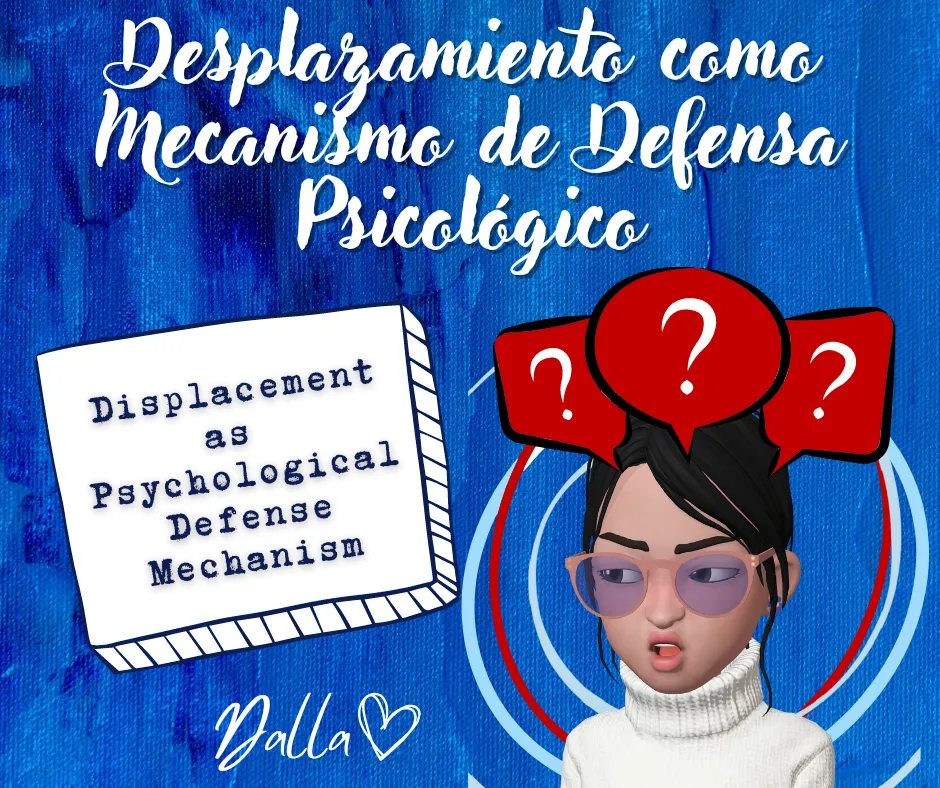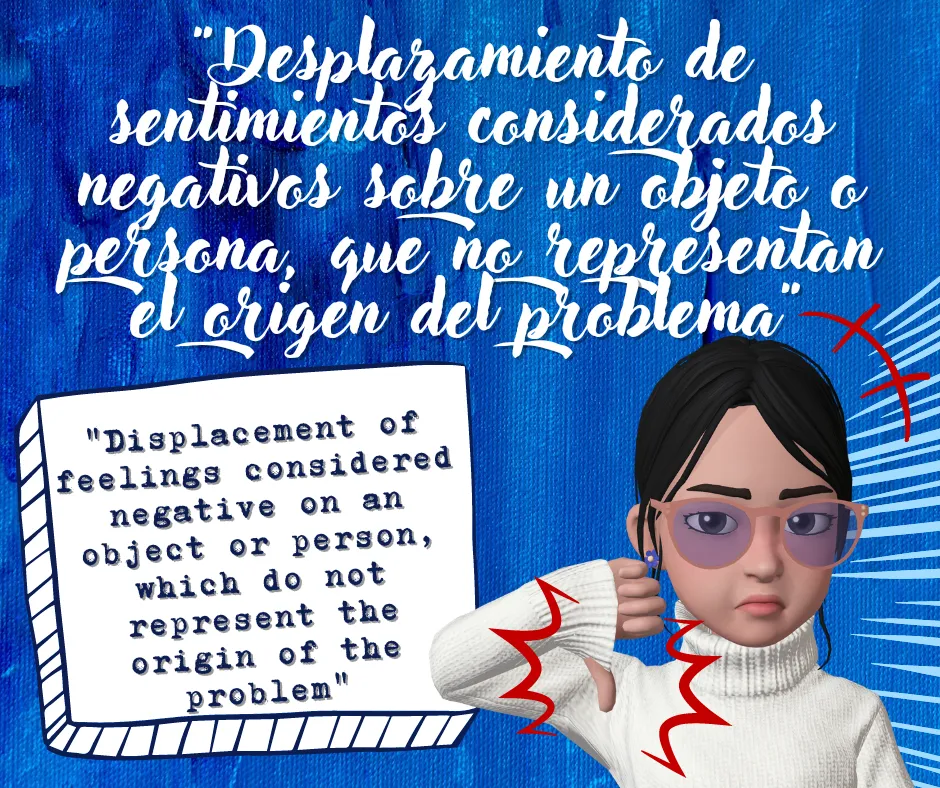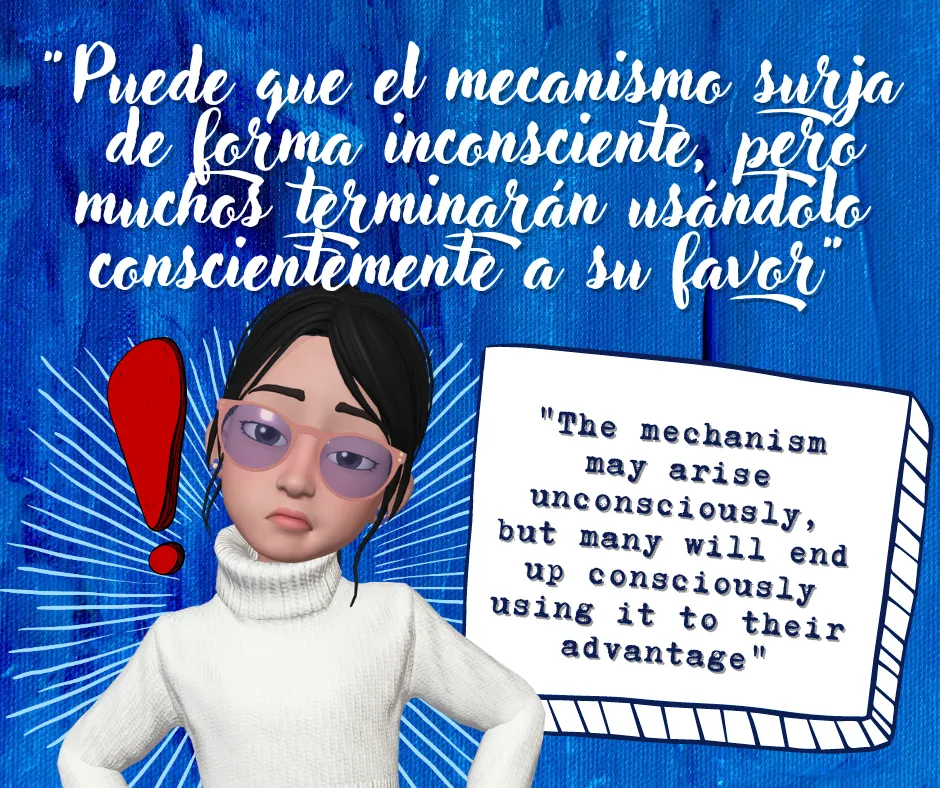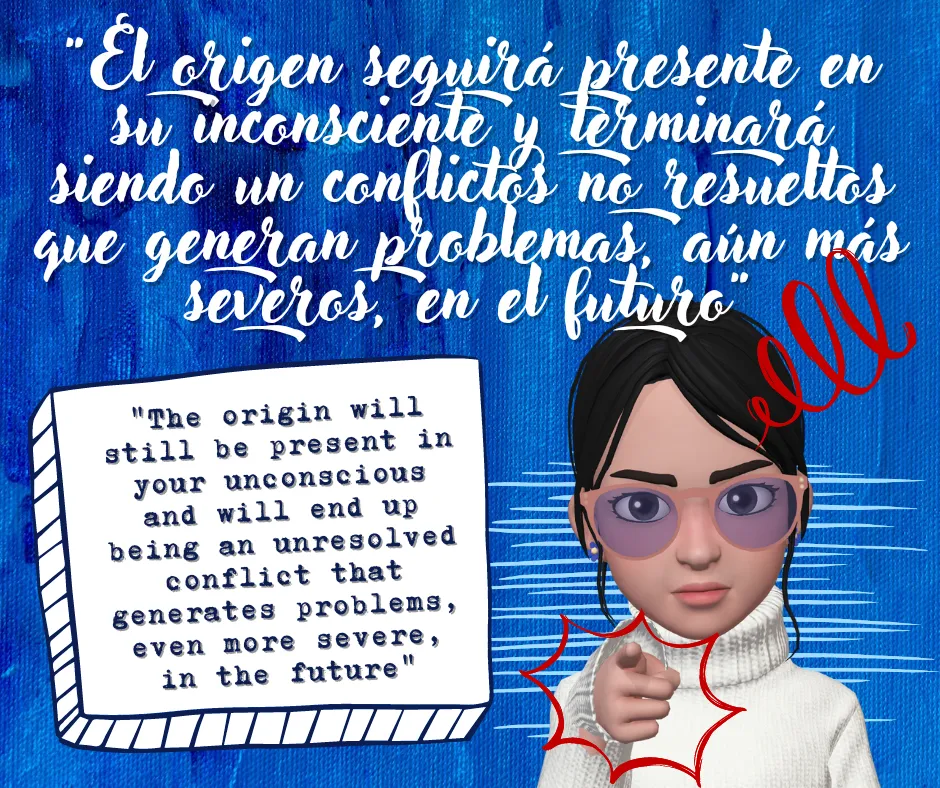

¿Has notado que algunas personas tienden a estallar emocionalmente fácilmente ante otras personas que no son las causantes de esa reacción, y el asunto se ha vuelto tan repetitivo que ya puedes decir que es una actitud característica de esa persona tan explosiva?
Si has visto con frecuencia eso que describo arriba, entonces podrías estar en presencia de alguien que está usando un Mecanismo de Defensa Psicológico, que se le está saliendo de control y podría estar Desplazando el sentimiento negativo originado por alguien o algo hacía otros que no tienen la culpa.
Have you noticed that some people tend to blow up emotionally easily in front of other people who are not the cause of that other person's reaction, and the issue has become so repetitive that you can already tell that it is a characteristic attitude of that explosive person?
If you have frequently seen what I describe above, then you could be in the presence of someone who is using a Psychological Defense Mechanism, which is getting out of control and could be Displacing the negative feeling originated by someone or something to others who are not to blame.

¡Saludos chicos! 🤗 Como ya les he contado con anterioridad, vengo haciendo una lista de post educativos donde les hablo de los "Mecanismos de Defensa Psicológicos", los cuales, en forma resumida y sencilla, son estrategias que usa nuestro inconsciente para evitar el daño o el dolor en nosotros mismos.
La idea de hacer estos post es que comprendan que el hecho de que sea el inconsciente el que pongan estos mecanismos en marcha no quiere decir que no debamos ser responsables de las consecuencias que se deriven de ellos y que, si somos conscientes de que los estamos usando de forma inadecuada, entonces intentemos evitarlos a través de la ayuda psicológica pertinente para no hacernos daño a nosotros mismos, ni a quienes nos rodean.
Entre estos mecanismos de los que les hablo, tenemos uno que es muy muy frecuente encontrarlo en las personas, y es porque si hacemos un análisis a nuestro alrededor podremos verlo fácilmente. A este mecanismo lo conocemos como "Desplazamiento" y es evidente en esa persona con la que te debes relacionar diariamente, pero es tan cambiante emocionalmente que la debes tratar con precaución porque no sabes de qué humor estará cada día, aun cuando la situación a su alrededor parezca estar tranquila, igual que siempre.
Greetings guys! 🤗 As I have told you previously, I have been making a list of educational posts where I talk to you about the "Psychological Defense Mechanisms", which, in a summarized and simple way, are strategies that our unconscious uses to avoid harm or pain in ourselves.
The idea of making these posts is that you understand that the fact that it is the unconscious that sets these mechanisms in motion does not mean that we should not be responsible for the consequences that derive from them and that, if we are aware that we are using them inappropriately, then we try to avoid them through the relevant psychological help to avoid hurting ourselves or those around us.
Among these mechanisms of which I speak to you, we have one that is very very frequent to find it in people, and it is because if we make an analysis around us we can easily see it. We know this mechanism as "Displacement" and it is evident in that person with whom you must relate daily, but is so emotionally changeable that you must treat them with caution because you do not know what mood they will be in every day, even when the situation around them seems to be calm, the same as always.



Sobre todo, en los ambientes de trabajo es muy frecuente verlos, porque nos vemos obligados a interactuar con personas con las que no tenemos afinidad, básicamente con personalidades complicadas y terminamos buscando, sin darnos cuenta, patrones de conducta en ella que nos avisen cuando está bien acercarnos o cuando está mal, para no arriesgarnos y ¡huir de ellos!
Este mecanismo realmente no es del todo negativo, igual que todos, porque surgen con la intención de protegernos, es una defensa de nuestra psique para intentar tener estabilidad ante los problemas del día a día. El problema es que el proteger a esa persona de forma exagerada puede terminar haciéndole daño a otros que están en contacto con ella y que no tienen la culpa de nada.
Por ello, está bien usarlos una que otra vez, pero cuando el estado se vuelve repetitivo, la persona que lo usa se vuelve conflictiva y genera un ambiente hostil a su alrededor al transferir todas lo sentimientos de amargura o rabia que tiene hacia algo o alguien, pero hacia otra situación, persona o grupo de personas.
Como verán al ser un desplazamiento de sentimientos considerados negativos, el objeto, que terminará siendo sobre el cual recaigan, será inocente, usualmente es un eslabón débil sobre la cual esa persona que está usando el mecanismo siente que puede descargar toda su rabia, inconformidad, hostilidad y resentimiento.
Puede que el mecanismo surja de forma inconsciente, es cierto, pero muchos terminarán usándolo conscientemente a su favor, cuando vean que se sienten liberados de todo eso que llevaban en su interior, sensación que no pueden sentir al drenar todos esos sentimientos sobre la persona o grupo de personas que los ocasionan, así que se aprovecharán y seguirán utilizándolo.
Especially in work environments it is very common to see them, because we are forced to interact with people with whom we do not have affinity, basically with complicated personalities and we end up looking for, without realizing it, behavior patterns in them that warn us when it is right to approach or when it is wrong, so as not to risk and run away from them!
This mechanism is actually not entirely negative, like all of them, because they arise with the intention of protecting us, it is a defense of our psyche to try to have stability in the face of the problems of everyday life. The problem is that protecting that person in an exaggerated way can end up hurting others who are in contact with them and who are not to blame for anything.
Therefore, it is fine to use them once in a while, but when the state becomes repetitive, the person who uses it becomes conflictive and generates a hostile environment around him by transferring all the feelings of bitterness or anger he has towards something or someone, but towards another situation, person or group of people.
As you will see, being a displacement of feelings considered negative, the object, which will end up being the one on which they fall, will be innocent, it is usually a weak link on which the person who is using the mechanism feels that he can unload all his rage, nonconformity, hostility and resentment.
The mechanism may arise unconsciously, it is true, but many will end up using it consciously in their favor, when they see that they feel liberated from all that they were carrying inside, a sensation that they cannot feel when draining all those feelings on the person or group of people that cause them, so they will take advantage of it and will continue using it.



Hay muchas razones por las cuales esta persona podría no decirle lo que piensa y siente al que realmente es el origen de sus males, probablemente es alguien de mayor autoridad, alguien que sabe que puede responderle mal y terminar causando más problemas que los que ya tiene o es alguien del cual depende, como en el caso de los empleadores con sus jefes o en el caso de las esposas con sus maridos.
Esos son los ejemplos más sencillos que encontrarán, da a veces risa leer en internet sobre ellos, usualmente se tiende a culpar a las hormonas, a la estación del año, a las fases lunares, etc, como los responsables de los estados cambiantes de algunas personas, pero la realidad es que la mayoría de las veces son el uso de estos mecanismos de forma tan patológica.
Al final tendremos un ambiente que siempre se tornará tenso cuando esta persona aparezca, sabremos que es alguien que tiene problemas personales, del tipo que sea, que no sabe resolver por sí misma y termina esparciendo todo el peso de su ira contra otros que se sienten obligados a aguantar; así como el tirano que oprime a su pueblo, así como los dictadores, por eso son personas que fácilmente pueden convertirse en lo peor conocido.
Un claro ejemplo de esto es el odio desmedido contra un grupo racial, político o religioso como respuesta a un hecho del pasado, puede que haya sido un evento sin tanta significancia como una pérdida económica o que represente una real crisis como la muerte de un familiar en manos de alguien o que erróneamente se asuma quien o quienes son los culpables.
La persona terminará intentando de afrontar la pérdida, el dolor o la herida en su autoestima al desplazar todo ese sentimiento que tenía hacía una persona, pero esta vez a un grupo completo, y es así como surgen los extremistas, los que generalizan los pensamientos negativos que tienen de una persona sobre otro o sobre otros que no son culpables de nada.
There are many reasons why this person might not tell what they think and feel to the one who is really the source of their ills, it is probably someone of higher authority, someone they know may respond badly to them and end up causing more problems than they already have or it is someone they depend on, as in the case of employers with their bosses or in the case of wives with their husbands.
Those are the simplest examples you will find, it gives sometimes a laugh to read on the internet about them, usually we tend to blame hormones, the season of the year, moon phases, etc, as the responsible for the changing states of some people, but the reality is that most of the time it is the use of these mechanisms in such a pathological way.
In the end we will have an environment that will always become tense when this person appears, we will know that it is someone who has personal problems, of whatever type, that does not know how to solve by itself and ends up spreading the full weight of his anger against others who feel obliged to endure; as well as the tyrant who oppresses his people, as well as dictators, so they are people who can easily become the worst known.
A clear example of this is the inordinate hatred against a racial, political or religious group as a response to a past event, it may have been an event without as much significance as an economic loss or it may represent a real crisis such as the death of a family member at the hands of someone or mistakenly assume who or who are the culprits.
The person will end up trying to cope with the loss, the pain or the wound in their self-esteem by displacing all that feeling they had towards one person, but this time to a whole group, and this is how the extremists emerge, those who generalize the negative thoughts they have of one person on another or on others who are not guilty of anything.



Este mecanismo se puede usar con personas, pero también se puede usar con situaciones, puede que desarrolles un miedo desmedido a estar encerrado en un ascensor producto de que en tu niñez estuviste atrapado por unas horas en una caja, estarás entonces desplazando los sentimientos ocasionados por algo hacía otra cosa o situación.
Pero, aun cuando esa persona disminuya su nivel de incomodidad, al expresar todo lo que siente contra esa persona o cosa que no es el verdadero causante de todo, no será la solución más adecuada para su problema, porque el origen seguirá presente en su inconsciente y terminará siendo uno de esos conflictos no resueltos que generan problemas aún más severos en el futuro.
Al final no solo seguirán teniendo el problema con el causante de su disgusto, sino que ampliará la problemática hacia esa o esas personas con las que comparte diariamente o con las que se tiene que cruzar en el camino, generando ya no solamente un ambiente hostil, sino varios ambientes de hostilidad que lo rodearan todo el tiempo, porque mientras más se relacione con personas, habrá más posibilidad de reaccionar mal.
Será siempre una persona conflictiva, y terminará desarrollando relaciones afectivas basadas en el miedo, la evasión y la inseguridad, así que ese medio de drenaje no podrá servirle por mucho tiempo, solo para generar una estela de enemigos a su alrededor.
Como ven amigos, realmente es un Mecanismo de Defensa que fácilmente se puede salir de control y complicar significativamente la vida de una persona, así que si sienten que lo usan ustedes mismos ¡por favor! háganse conscientes de él e intenten pensar antes de reaccionar, pero lo más importante es que busquen la ayuda pertinente para solventar el conflicto que los lleva a responder de esa forma, recuerden que nadie tiene la culpa de sus problemas personales, somos nosotros los únicos responsables de solucionarlos y de aprender a gestionar nuestras emociones.
This mechanism can be used with people, but it can also be used with situations, you may develop an excessive fear of being locked in an elevator because in your childhood you were trapped for a few hours in a box, then you will be displacing the feelings caused by something to something else or situation.
But, even if that person decreases their level of discomfort, by expressing everything they feel against that person or thing that is not the real cause of everything, it will not be the most adequate solution for their problem, because the origin will still be present in their unconscious and will end up being one of those unresolved conflicts that generate even more severe problems in the future.
In the end, not only will you continue to have the problem with the person who caused your displeasure, but you will extend the problem to that or those people with whom you share daily or with whom you have to cross paths, generating not only a hostile environment, but several hostile environments that will surround you all the time, because the more you relate to people, the more likely you will react badly.
He will always be a conflictive person, and will end up developing affective relationships based on fear, evasion and insecurity, so this means of drainage will not be able to serve him for long, only to generate a trail of enemies around him.
As you see friends, it really is a Defense Mechanism that can easily get out of control and significantly complicate the life of a person, so if you feel that you use it yourself, please! become aware of it and try to think before reacting, but the most important thing is to seek the relevant help to resolve the conflict that leads you to respond in that way, remember that no one is to blame for their personal problems, we are the only ones responsible for solving them and learning to manage our emotions.



Todos los banners fueron creados por @liveofdalla usando Canvas y Picsart con recursos gratuitos de ambas Apps.
(Eng) All the banners were created by @liveofdalla using Canvas and Picsart with free resources from both Apps.
DeepL
